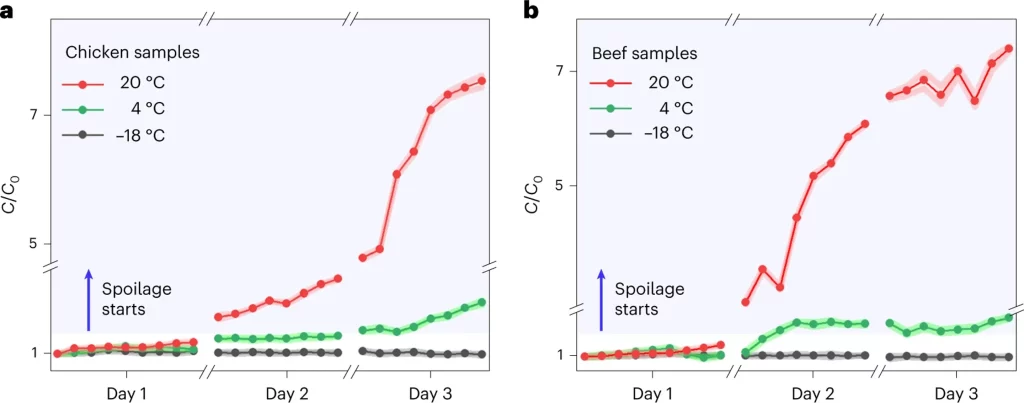A team of researchers from Koç University in Turkey has developed a tiny sensor that can monitor the freshness of protein-rich foods like meat, chicken, and fish in real time and send the data to your smartphone. The device has the potential to revolutionize the way we monitor and manage food freshness. Here are the details…
Researchers from Koç University Develop a Revolutionary Sensor for Real-Time Food Freshness Monitoring
The world is addicted to buying things. We buy too much food, clothes, electronics, and all the other things that we don’t need. This is a problem because it wastes resources and contributes to climate change. For example, every year, one-third of all food produced globally is lost or wasted. That’s about 1.4 billion tons of food.

In addition to the economic and environmental costs, food waste also poses a health risk. When food spoils, it can produce harmful bacteria that can cause food poisoning. Food poisoning can cause nausea, vomiting, diarrhea, and other symptoms. In some cases, food poisoning can be fatal. It is not always easy to tell when food has spoiled. Some foods, such as meat and poultry, can look and smell fine even when they are contaminated with harmful bacteria.
Until now, it was difficult for ordinary people to detect the decay of food. However, a new sensor developed by researchers at Koç University makes it easy for anyone to do. The sensor is small and planned to be affordable, and it can be attached to any food container. When the sensor detects that food is starting to spoil, it sends a notification to your smartphone. This way, you can always know when food is no longer safe to eat.
The researchers tested their sensor in packaged chicken breasts and rib steak to demonstrate the real-world application of the device. The meat samples were stored in different conditions: in a freezer, in a refrigerator, and at room temperature. Over three days, the capacitance of the sensor monitoring the room-temperature samples went up, indicating that biogenic amines were being released from the meat as it spoiled. This, say the researchers, indicates that the sensor efficiently detected spoilage.
“We have tested the sensor using chicken and beef samples stored under various storage conditions to demonstrate a real-life application for the sensor,” the researchers said. “The sensor presented a reliable performance, such that the spoilage of foods was predicted during three-day measurement by instantaneous sensor readings using a mobile phone. On the third day, the room-temperature-stored samples showed a 700% change in sensor response compared with the samples stored in a freezer, which proves the sensor operation for the detection of spoilage.”
The new sensor is still in the early stages of development, but it has the potential to revolutionize the way we monitor and manage food freshness. If it is successful, it could help to reduce food waste and improve food safety worldwide.
RELATED:
- Best Gaming Mouse in 2023 under INR 1000
- India to Become World’s Largest Smartphone Market Soon, Apple to Help
- Unihertz Jelly Star miniature smartphone running Android 13 launched
- Samsung W24 & W24 Flip luxury foldable smartphones visit 3C certification website
- Get Xiaomi Civi 3 Disney Limited Edition smartphone at Giztop
(via)






